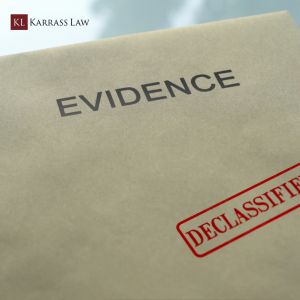What Kind of Evidence is Needed to Pursue a Civil Fraud Suit?
Posted on March 31, 2025

At the core of every legal dispute is the evidence, and that goes for civil fraud suits, too. Whether you’re the plaintiff or the defendant, the evidence that is used in trial or negotiations is key to determining the results of your case. In civil court, the burden of proof lies with the plaintiff, and it is typically lower than in criminal fraud cases. However, the evidence still needs to be clear, convincing, and backed by a strong legal strategy. If you’re pursuing civil action related to fraud, contact the experienced civil litigation lawyers at Karrass Law to help you build a robust defence. For more insight from our knowledgeable and experienced fraud lawyers, book a complimentary virtual or in-person lawyer consultation.
What Must a Successful Civil Fraud Case Prove?
To understand what strong supporting evidence looks like in a civil lawsuit, it’s important to better understand what a successful fraud case looks like in civil law or civil courts. In Ontario, civil fraud is not defined explicitly by a specific statute or law. However, it is still recognized as a valid legal claim if you have been seriously misled or deceived. So, to succeed in a civil fraud claim, you and your civil lawyer generally must prove the following:
- There was a false representation made by the defendant (i.e. they lied to you).
- The defendant was aware that what they were saying was being misrepresented or was not true
- The defendant had intended to deceive the plaintiff
- The lies, misrepresentations, or untrue statements informed the plaintiff’s decision-making and understanding
- The plaintiff had financial losses or suffered damages as a result of the false representations
When you work with a civil litigation lawyer who can help you leverage the evidence available to convince the court that all of the above is true and that you and any other plaintiffs suffered losses as a result of fraud, you are more likely to be successful in your lawsuit. To explore whether you have a viable civil case, book a consultation with the experts at Karrass Law.
Read on for more insight into what types of evidence can be used in civil fraud suits.
Types of Evidence to Support Civil Fraud Lawsuits
Successfully pursuing a civil fraud claim in Ontario requires meeting a specific legal threshold known as the burden of proof. In civil cases, this burden is measured on a balance of probabilities, which means the plaintiff’s fraud lawyer must prove that it is more likely than not that the fraud occurred.
- Documentation: Any form of a paper trail is vital in fraud cases seen in civil court, from emails and other forms of written communication to contracts, financial records, digital logs, audits, and more.
- Witness Testimony: Whether they are employees or colleagues, third parties, or experts, strong witness testimonies can strengthen your case. At Karrass Law, your civil litigation lawyer will help identify key witnesses, preparing them to give statements and affidavits or testify in court.
- Digital Records: Fraud or financial schemes often involve electronic records, including deleted emails, recovered files, metadata from documents, IP address logs, text messages, or even social media messages. Focusing on the early preservation of this evidence is crucial, as digital data can be manipulated or erased.
- Admissions: Any admission, partial confession, or inconsistent narrative from the opposing party can support the fraud claim. These may emerge during discovery, cross-examination, or through careful analysis of prior statements.
Pursue Civil Action for Fraud with Skilled Lawyers at Karrass Law
Pursue your financial justice and legal action for fraud with a high-level civil litigation lawyer at Karrass Law. Robert Karrass and our experienced team of fraud lawyers and legal experts are here to build a strong case for you and help you advocate for your best interests. If you’ve been the victim of fraud, book a lawyer consultation with our team for complimentary legal advice and to pursue your civil lawsuit.
